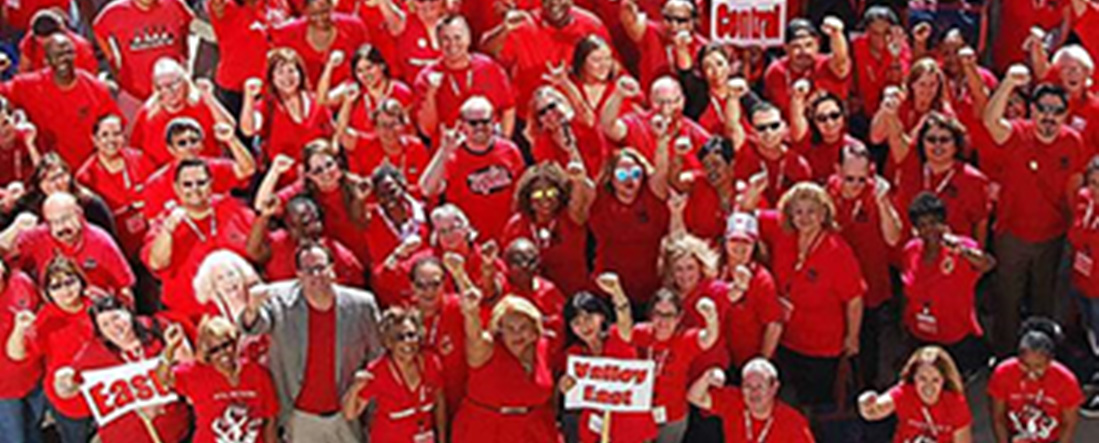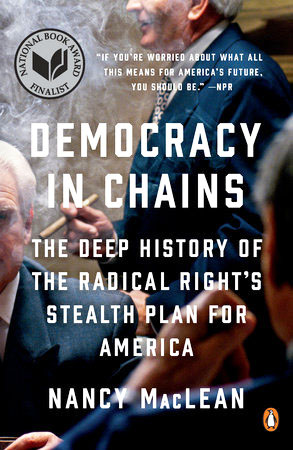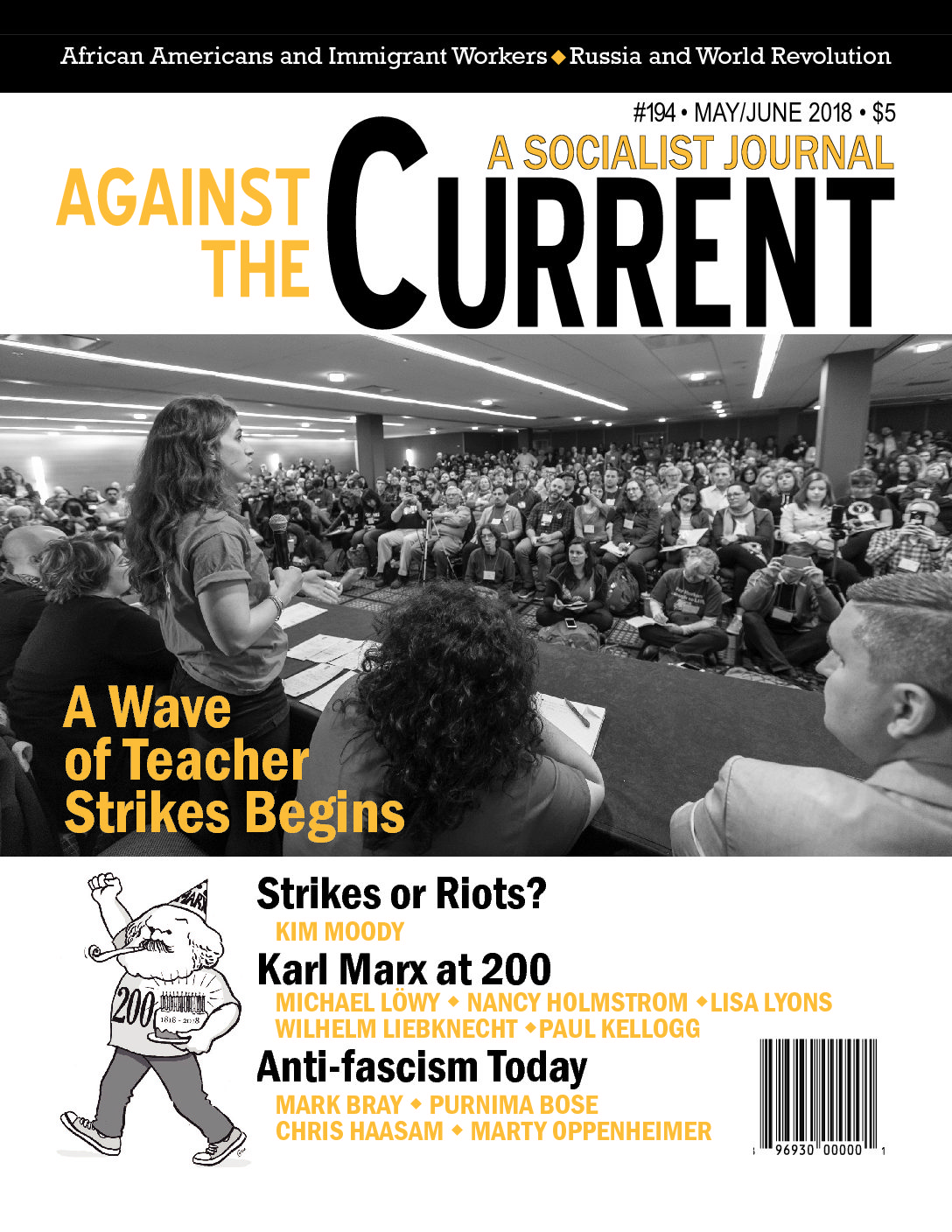Against the Current, No. 194, May/June 2018
-
Defending "Our Democracy"
— The Editors -
African Americans and Immigrant Workers
— Malik Miah -
On the "Duty to Protect"
— David Finkel - Fighting the Extreme Right
-
Confronting the Right: An Introduction
— The Editors -
Taking on the Far-Right Menance
— an interview with Mark Bray -
For Campus Free Speech
— Purnima Bose -
FC St. Pauli: Antifascist, Antiracist
— Chris Haasen -
What Fascism Is, and Isn't
— Martin Oppenheimer - Karl Marx at 200
-
A Birthday Bash for Marx
— The Editors -
Marx's Ecology: Recovered Legacy
— Michael Löwy -
London Pub Crawl with Karl Marx
— Wilhelm Liebknecht -
Marx at 200; Capital at 150
— Nancy Holmstrom -
"Ruthless Criticism of All That Exists"
— Paul Kellogg - Russia & World Revolution
-
1917 and the Colonial Revolution
— Peter Solenberger - Review Essay
-
Review Essay: Are Strikes Over?
— Kim Moody - Reviews
-
Animating the Great Migration and After
— Brian Dolinar -
Can a Minority Overthrow the Majority?
— Dianne Feeley -
Popular Front Counter-Memories
— Sarah Ehlers -
Modernity and Negations
— David Finkel -
An Urban Teacher Union Epic
— Marian Swerdlow - In Memoriam
-
Remembering Joanne Landy
— Samuel Farber
Defending "Our Democracy"
— The Editors
AMIDST THE SWIRLING CHAOS of the Trump White House, with scandals and coverup and threats of firing the investigators, and Cruise missile launches to gratify the big twit’s ego, let’s not lose sight of the underlying fact that what’s called “American democracy” really is under attack — and not from the outside.
Even more important is how democracy is being defended, and hopefully extended — by teachers in West Virginia, Oklahoma and Kentucky, by the magnificent youth upsurge in the wake of the Parkland massacre; by the resistance against Trump’s brutal immigration policies; by the new movement fighting back against sexual harassment and rape culture.
African Americans and Immigrant Workers
— Malik Miah
MOST AFRICAN AMERICANS support the right of young undocumented immigrants known as DACA (“Deferred Action for Childhood Arrival”) youth to stay in the country and become citizens. They reject the racism of Trump’s anti-immigration rhetoric.
At the same time, their attitude toward older immigrants in undocumented status — those working in “blue collar” manufacturing jobs — is not so simple. These immigrants are viewed as job competitors....
On the "Duty to Protect"
— David Finkel
THREE FACTS STAND out about the April 14 U.S.-British-French missile strike on suspected (probable) Syrian chemical weapons facilities:
1) The action was blatantly illegal under international law, since Syria had not attacked or threatened a any of these three states.
2) It was illegal under U.S. law, since there was no Congressional authorization — as much as many Democrats would have eagerly given it.
3) It changed nothing on the ground to affect the ongoing horrific war, and probably wasn’t even intended to....
Fighting the Extreme Right
Confronting the Right: An Introduction
— The Editors
WITH THE GROWTH of the reactionary, racist and sometimes violent, even terrorist right wing in the present period under Trump, a multifaceted discussion is happening in left and progressive circles about what these developments mean and how to respond.
The articles we’re presenting here touch on a number of issues. Does the growth of right-wing quasi-populism, so dishonestly but skillfully manipulated by Trump and rightwing media, foreshadow a brand of “American fascism”?
When purveyors of white supremacy are invited to speak on college campuses, are they actually aiming to win support — or rather to provoke trouble and gain publicity? What tactics to oppose them are both principled and effective?...
Taking on the Far-Right Menance
— an interview with Mark Bray
MARK BRAY IS a lecturer in history at Dartmouth College, and author of Antifa, The Anti-Fascist Handbook. He was interviewed by Dianne Feeley and David Finkel of the ATC editorial board.
Against the Current: As an historian who’s also been an Occupy activist, what led you to call your book a handbook?
Mark Bray: I wanted the book to be practical, not just a history. I also wanted to include some discussion of political and philosophical ideas — around violence and non-violence, freedom of speech, strategy, tactics, and so forth. At the end of the book, I included some lessons from current and former anti-fascists, people who are strategizing against the far right....
For Campus Free Speech
— Purnima Bose
SINCE THE NOVEMBER 2016 elections, campus controversies regarding free speech have become more frequent and received much publicity. Journalists and academics have pontificated on the seeming illiberal nature of contemporary academia and politicians have been only too willing to share their wisdom: Attorney General Jeff Sessions has made campus free speech the subject of an address at Georgetown University Law School; members of Congress have convened hearings on the topic; and the commander-in-chief himself has moralized via Twitter.(1)
In a familiar litany, commentators cite incidents at Middlebury College over a speech by Charles Murray, at the University of California in response to an invitation to Milo Yiannopoulos, and at the University of Wisconsin during Ben Shapiro’s lecture as evidence for a campus environment that is hostile to right-wing viewpoints....
FC St. Pauli: Antifascist, Antiracist
— Chris Haasen
ST. PAULI is a second-division professional football team from a district in the port city of Hamburg, Germany. The historic district is known as the red-light (prostitution) area, where sailors would find a few moments of sexual passion during their short leave.
The local team, FC St. Pauli, established in 1910, was just a regular football team with the same inclination to follow the national-socialist policy during fascist Germany. Their stadium was named after Wilhelm Koch, one of the club’s presidents, who had been a member of the Nazi party....
What Fascism Is, and Isn't
— Martin Oppenheimer
MANY PEOPLE SEE Donald Trump as the harbinger of a fascist regime and the “alt-right” as proto-Nazis. Real-existing Fascism as practiced in 1930s-’40s Germany and Italy, however, claimed to represent a revolutionary movement to overturn the old order — in contrast to counter-revolutionary movements that seek to restore an earlier regime of landlords and capitalists after a popular government has engaged in reforms threatening that class.
Thus, for example, the Nazis made no effort to restore a Kaiser.
Fascists did come to power in Germany and Italy more or less legally, and maintained the existing parliamentary system for a time. But this was only to prepare for its extinction and replacement by a “New Order.”...
Karl Marx at 200
A Birthday Bash for Marx
— The Editors
Against the Current is throwing a modest birthday party to mark the bicentennial of one of our favorite thinkers, Karl Marx (1818-1883). Beginning in this issue and over the next few, we’ve asked a number of writers for brief pieces on some of Marx’s most important and relevant contributions to the theory and practice of revolutionary human emancipation. In view of the incredibly wide range of Marx’s interests and involvements, we can’t hope to touch on them all — we hope what we’re publishing here will whet readers’ appetites for more. Possibly Karl himself and some of his close collaborators and classic followers will make appearances…enjoy the party and please bring a friend or fellow activist!...
Marx's Ecology: Recovered Legacy
— Michael Löwy
WHILE MAINSTREAM ECOLOGICAL theory has been dismissive of Karl Marx, serious research in recent decades has recovered some of his very important insights on ecological issues. The pioneers have been James O’Connor and the journal Capitalism, Nature and Socialism — a tradition continued by Joel Kovel — but the most systematic and thorough investigations on Marx’s ecological views are those of John Bellamy Foster and his friends from Monthly Review.
Many ecologists accuse Marx of “productivism.” Is this accusation justified? No, insofar as nobody denounced as much as Marx the capitalist logic of production for production: the accumulation of capital, wealth and commodities as an aim in itself....
London Pub Crawl with Karl Marx
— Wilhelm Liebknecht
ONE EVENING, EDGAR Bauer, acquainted with Marx from their Berlin time and then not yet his personal enemy […], had come to town from his hermitage in Highgate for the purpose of “making a beer trip.”
The problem was to “take something” in every saloon between Oxford Street and Hampstead Road — making the something a very difficult task, even by confining yourself to a minimum, considering the enormous number of saloons in that part of the city. But we went to work undaunted and managed to reach the end of Tottenham Court Road without accident....
Marx at 200; Capital at 150
— Nancy Holmstrom
KARL MARX IS having a comeback today. Two hundred years after his birth and a decade beyond the 2008 financial panic, there’s growing awareness of capitalism’s propensity to crises and ecological problems, and the fact that global inequality has increased to an obscene degree.
That this is happening 150 years after the publication of Das Capital, Marx’s magnum opus, shows the importance of understanding his work. Rather than being outdated, it is even more relevant today than when it was published.
Capital is first and foremost an unsurpassed explanation of the very specific nature and development of the system of capitalist production. Relatively new in Marx’s day, this system has become so ubiquitous that its particularities are often obscure to those who live within it, as a fish might be unaware of the nature of water.,,,
"Ruthless Criticism of All That Exists"
— Paul Kellogg
FRUSTRATED AT WHAT his friend Frederick Engels called the “peculiar product … known as ‘Marxism’ in France,” Karl Marx at one point declared “One thing for sure — me, I’m not a Marxist.”(1) If there were many reasons for Marx to be “not a Marxist” in the 19th century, the decades since have given us many more.
Marx’s name, over several generations, has been associated with real horrors — the Gulag in the former Soviet Union, state-executions on a mass scale in China, secret police regimes in Eastern Europe, the killing fields in Kampuchea (Cambodia) … to name just a few.
It was not supposed to be this way....
Russia & World Revolution
1917 and the Colonial Revolution
— Peter Solenberger
THE 1917 REVOLUTION swept across Russia from city to city, town to town, and village to village. It didn’t stop at the borders of the Czarist Empire. Its fire, sparks and light spread to neighboring countries and around the world.
As explained in articles in these pages, the 1917 Revolution was multiple revolutions. Democrats against monarchy. Workers against capitalists. Peasants against landowners. Oppressed nationalities against empire. Soldiers against senseless slaughter. Women against patriarchy. These came together to overthrow the czar and then to overthrow capitalism.
The conditions that led to the Russian Revolution also existed around the world, in varying combinations and to varying degrees, which accounted for the rapid spread of its ideas and example....
Review Essay
Review Essay: Are Strikes Over?
— Kim Moody

Riot. Strike. Riot:
The New Era of Uprisings
By Joshua Clover
London: Verso, 2016, 208 pages, $24.95 hardback.
IN HIS LIVELY and engaging book Riot. Strike. Riot, Joshua Clover presents a unique (and avowedly Marxist) argument for why he thinks employed workers are less likely to be the source of social upheaval and why, he argues, riots are replacing strikes as the major expression of social revolt in today’s turbulent capitalism.
There is a lot of interesting and original material in this book. Much of what Clover says about the turbulence of contemporary capitalism and even its apparent slowing down is on the money, even if one disagrees with some specifics of his analysis. More than that, he points to a rise in social struggle, a promise that everyone on the left is certain to relish....
Reviews
Animating the Great Migration and After
— Brian Dolinar
Pioneering Cartoonists of Color
By Tim Jackson
University Press of Mississippi, 2016,
128 pages with 170 black and white
illustrations, $35 paperback.
AFRICAN-AMERICAN CARTOONISTS at one time were the most visible artists illustrating the tragedy and humor of Black life in America. A new book, Pioneering Cartoonists of Color, is the first comprehensive study of a little-known page in Black history, written by Tim Jackson, himself an African-American cartoonist.
Even Jackson admits that early in his career he was uninformed about those who had come before him. Reference books on cartoon history simply did not include African Americans. With this book, he recovers the forgotten names and lost art works by cartoonists of color....
Can a Minority Overthrow the Majority?
— Dianne Feeley
Democracy in Chains:
The Deep History of the Radical
Right’s Stealth Plan for America
By Nancy MacLean
Viking Books, 2017, 334 pages, $28 hardback.

THERE IS A growing understanding about the radical liberatarians’ links and operational methods. Many of us are now aware of ALEC (American Legislative Exchange Council) and how it shapes model laws that are then introduced into various state legislatures. These are designed to restrict voter rights, curtail teachers’ union rights to negotiate their working conditions or limit access to birth control and abortion.
Nancy MacLean’s Democracy in Chains: The Deep History of the Radical Right’s Stealth Plan for America traces the construction of this ideology and its methods. She begins in mid-1950s Virginia, as its elites react to Brown v. the Board of Education....
Popular Front Counter-Memories
— Sarah Ehlers
Anti-Imperialist Modernism:
Race and Transnational Culture from the Great Depression to the Cold War
By Benjamin Balthaser
University of Michigan Press, 2016, 320 pages,
$80 hardcover, $64.95 e-book.
WRITING AGAINST THE grain of a good deal of progressive labor history, and providing a counter-memory to popular imaginations of the Depression-era United States, Benjamin Balthaser’s indispensible first book, Anti-Imperialist Modernism: Race and Transnational Culture from the Great Depression to the Cold War, offers an unprecedented history of anti-imperialist activism and cultural production during the interwar period.
Anti-Imperialist Modernism accounts for the complex relationships between movements for racial and ethnic self-determination and the internationalist, cross-racial activism of the Popular Front. It complements new scholarship in left literary studies that has turned concertedly to questions of Black liberation, intersectional feminism and anti-imperialist solidarity.
At the same time, the book demonstrates important relationships between scholarship on literary radicalism and work in fields such as African diaspora studies, Indigenous Studies, and borderlands studies.(1),,,
Modernity and Negations
— David Finkel
The End of Jewish Modernity
By Enzo Traverso
Translated by David Fernbach
Pluto Press, 2016, 132 pages plus notes and index, $24 paperback.
What is Modern Israel?
By Yaskov M. Rabkin
Translated by Fred A. Reed
Pluto Press, 2016, 187 pages plus notes and index, $27 paperback.
TWO CHALLENGING BOOKS, from differing vantage points, offer complementary perspectives on some of the tragedies confronting today’s world, and their historical backdrops.
Enzo Traverso is a scholar of European history for whom the fascination of Jewish history “is the prism it offers for reading the history of the world.” By “Jewish modernity” in this study, he means a phenomenon now fading away, “a phase of Jewish history that is inextricably intertwined with history in general, and the history of Europe in particular.” (Traverso, 6, 7)...
An Urban Teacher Union Epic
— Marian Swerdlow
A Fight for the Soul of Public Education:
The Story of the Chicago Teachers Strike
By Steven K. Ashby and Robert Bruno. ILP Press (Cornell University Press), 2016, 309 pages,
$35 hardcover.
Strike for America:
Chicago Teachers Against Austerity
By Micah Uetricht
Verso Books, 2014, 144 pages, $19.95 paperback.
How to Jump-Start Your Union: Lessons from the Chicago Teachers
A Labor Notes Book
$15 paperback
(order from www.labornotes.org/store).
FOR TEACHER UNION activists, for champions of social movement unionism, for advocates of education justice, the 2012 Chicago Teachers Union’s (CTU) strike lit up the sky like a comet. Clearly the challenges of winning public support for strikes today are more formidable than they were in the middle decades of the 20th century when most teachers and other public sector workers first organized....
In Memoriam
Remembering Joanne Landy
— Samuel Farber
JOANNE LANDY PASSED away on October 14, 2017, on the eve of her 76th birthday, after a long struggle with cancer.
I first met Joanne almost 60 years ago at a meeting of the Politics Club, a front for the left-wing “Shachtmanites” (Third Camp socialists) at the University of Chicago campus, to celebrate and analyze the overthrow of the Batista dictatorship that had taken place several days earlier in Cuba.
Not too long after that, Joanne left for New York, so I only got to know her well when we met again in Berkeley as graduate students in the fall of 1964....

